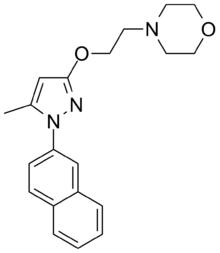S1RA
 | |
| Identifiers | |
|---|---|
| |
| CAS Number | 878141-96-9 |
| ChemSpider | 28641653 |
| UNII |
ZW18DSD1H4 |
| ChEMBL | CHEMBL2170062 |
| Chemical and physical data | |
| Formula | C20H23N3O2 |
| Molar mass | 337.42 g/mol |
| 3D model (Jmol) | Interactive image |
| |
| |
S1RA, E-52862, or 4-(2-((5-methyl-1-(naphthalen-2-yl)-1H-pyrazol-3-yl)oxy)ethyl)morpholine is a selective sigma-1 receptor antagonist, with a reported binding affinity of Ki = 17.0 ± 7.0 nM, selective over the sigma-2 receptor and against a panel of other 170 receptors, enzymes, transporters and ion channels.[1][2] In preclinical studies, S1RA has demonstrated efficacy in relieving neuropathic pain and pain in other sensitizing conditions, associated with an improvement of the emotional negative state.[2][3][4][5]
S1RA is being developed by Esteve for the treatment of neuropathic pain and the potentiation of opioid analgesia and has successfully completed Phase I clinical trials showing good safety and tolerability, and a pharmacokinetic profile compatible with once a day oral administration.[6] Phase II clinical trials are currently underway, making S1RA the first selective sigma-1 receptor antagonist evaluated in humans for these conditions.
References
- ↑ Díaz JL, Cuberes R, Berrocal J, Contijoch M, Christmann U, Fernández A, Port A, Holenz J, Buschmann H, Laggner C, Serafini MT, Burgueño J, Zamanillo D, Merlos M, Vela JM, Almansa C (2012). "Synthesis and Biological Evaluation of the 1-Arylpyrazole Class of σ1 Receptor Antagonists: Identification of 4-{2-[5-Methyl-1-(naphthalen-2-yl)-1H-pyrazol-3-yloxy]ethyl}morpholine (S1RA, E-52862)". J. Med. Chem. 55 (19): 8211–8224. doi:10.1021/jm3007323. PMID 22784008.
- 1 2 Romero L, Zamanillo D, Nadal X, Sánchez-Arroyos R, Rivera-Arconada I, Dordal A, Montero A, Muro A, Bura A, Segalés C, Laloya M, Hernández E, Portillo-Salido E, Escriche M, Codony X, Encina G, Burgueño J, Merlos M, Baeyens JM, Giraldo J, López-García JA, Maldonado R, Plata-Salamán CR, Vela JM (2012). "Pharmacological properties of S1RA, a new sigma-1 receptor antagonist that inhibits neuropathic pain and activity-induced spinal sensitization". Br. J. Pharmacol. 166 (8): 2289–2306. doi:10.1111/j.1476-5381.2012.01942.x. PMID 22404321.
- ↑ Nieto FR, Cendán CM, Sánchez-Fernández C, Cobos EJ, Entrena JM, Tejada MA, Zamanillo D, Vela JM, Baeyens JM (2012). "Role of sigma-1 receptors in paclitaxel-induced neuropathic pain in mice". J. Pain. 13 (11): 1107–1121. doi:10.1016/j.jpain.2012.08.006. PMID 23063344.
- ↑ Bura AS, Guegan T, Zamanillo D, Vela JM, Maldonado R (2013). "Operant self-administration of a sigma ligand improves nociceptive and emotional manifestations of neuropathic pain". Eur. J. Pain. 17: 832–843. doi:10.1002/j.1532-2149.2012.00251.x. PMID 23172791.
- ↑ González-Cano R, Merlos M, Baeyens JM, Cendán CM (2013). "σ1 receptors are involved in the visceral pain induced by intracolonic administration of capsaicin in Mice". Anesthesiology. 118 (3): 691–700. doi:10.1097/ALN.0b013e318280a60a. PMID 23299362.
- ↑ Abadias M, Escriche M, Vaqué A, Sust M, Encina G (2013). "Safety, tolerability and pharmacokinetics of single and multiple doses of a novel sigma-1 receptor antagonist in three randomized phase I studies". Br. J. Clin. Pharmacol. 75 (1): 103–117. doi:10.1111/j.1365-2125.2012.04333.x. PMID 22607269.
External links
- (Compound datasheet in Esteve company website)